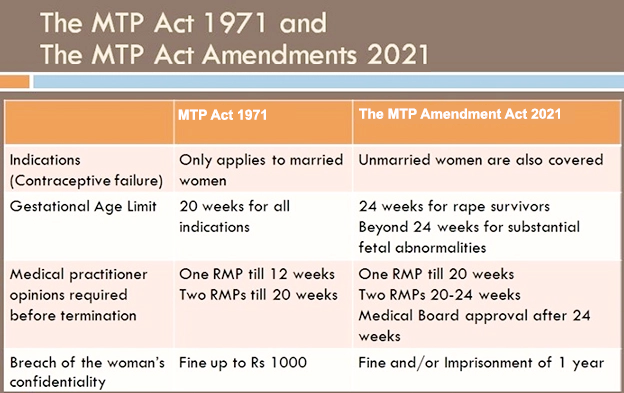Social Justice
Supreme Court Allows Termination of Pregnancy for Rape Survivor
- 25 Aug 2023
- 3 min read
For Prelims: Supreme Court of India, Medical Termination of Pregnancy (MTP) Act, 1971, Abortion Law in India, Reproductive Rights, Shantilal Shah Committee.
For Mains: Legal Provisions Related to Abortion in India, Major Issues Related to Women.
Why in News?
Observing that pregnancy outside marriage, especially in cases of sexual assault, is injurious and a cause of stress, the Supreme Court of India allowed a rape survivor from Gujarat to terminate her 27-week pregnancy.
- The court overruled the Gujarat High Court’s order that denied her request and directed the hospital to carry out the procedure without any delay.
- Under the Medical Termination of Pregnancy (MTP) Amendment Act 2021, the upper limit for termination of pregnancy is 24 weeks.
What are the Legal Provisions Related to Abortion in India?
- Until the 1960s, abortion was prohibited in India, and violating this led to imprisonment or fines under Section 312 of the Indian Penal Code.
- The Shantilal Shah Committee was set up in the mid-1960s to investigate the need for abortion regulations.
- Based on its findings, the Medical Termination of Pregnancy (MTP) Act, 1971 was enacted, allowing safe and legal abortions, safeguarding women's health, and reducing maternal mortality.
- The MTP Act, 1971, allows abortion up to 20 weeks of gestation, with the consent of the woman and on the advice of one registered medical practitioner (RMP). However, the law was updated in 2002 and 2021.
- The 2021 amendment permits abortion from 20 to 24 weeks of gestation for specific cases like rape survivors, with approval from two doctors.
- It sets up state level Medical Boards to decide if a pregnancy may be terminated after 24 weeks in cases of substantial fetal abnormalities.
- The 2021 amendment permits abortion from 20 to 24 weeks of gestation for specific cases like rape survivors, with approval from two doctors.
- It extends the failure of contraceptive clauses to unmarried women( initially only married women), allowing them to seek abortion services on grounds of their choice, irrespective of their marital status.
- Consent requirements vary based on age and mental state, ensuring medical practitioner oversight.
- Recent Supreme Court judgments reaffirm women's bodily autonomy. Courts recognized abortion rights in cases of rape and acknowledged reproductive choice as a component of personal liberty.
Note:
In Justice K.S. Puttaswamy (Retd.) vs. the Union Of India And Others (2017), the Supreme court recognized the constitutional right of women to make reproductive choices, as a part of personal liberty under Article 21 of the Indian Constitution, which, despite laying a robust jurisprudence on reproductive rights and the privacy of a woman, does not translate into a fundamental shift in power from the doctor to the woman seeking an abortion.





